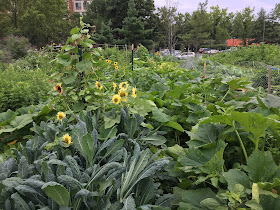The 'Food Miles' or the transportation costs of shipping produce long distances is avoided with urban agriculture. There has been much debate and some research about how true that is with some research even showing that grocery chains do better with the Food Miles metric than farmers markets .
The local produce grown in community gardens have additional social benefits which add value that is often not calculated. An excellent article describing the Bottoms Up Community Garden in the Lower Bottoms neighborhood in Oakland, CA points out the community organizing power of community gardens. Many of the posts in this blog also point out benefits that are not usually calculated when doing cost/ benefit comparisons of local produce grown in community gardens as compared to produce farmed in a distant location.
It is well established that dense cities can only produce a very small percentage of their food needs within the confines of the city so there has to be a mix of locally grown and trucked in food in our diets. However, a recent article in National Geographic Magazine, September 2017, "A Tiny Country Feeds the World" by Frank Viviano, highlights intensive agriculture in the Netherlands which is about the size of the state of Maryland yet produces the second highest food export value in the world after the USA. Much of this is done using greenhouses and the latest technology to minimize water use and produce higher amounts per acre than other countries. They have created what they call Food Valley where the latest research on agriculture at Wageningen University and Research is combined with entrepreneurship to grow more food and share the technological advances with the world, much the same as the relationship between Stanford University and Silicon Valley. It seems that the calculus is constantly changing and improvements in materials and methods used research and technology, I believe, keep shifting the needle toward urban agriculture producing larger percentages of our food using less inputs.
So does Urban Agriculture have the ability to impact climate change? A recent article says no. This is true at the moment but with the technological changes happening at a feverish pace that may change sooner than later. Energy use for transportation, heating and cooling, manufacturing and housing play a big role in greenhouse gas emissions so improvements must be made in those areas as well. The agricultural sector including large and small farms and urban farms will have to help as well. I believe urban farms and community gardens will contribute to slowing down global warming and impacting climate change and in fact lead the way in some cases. The social benefits of community gardening will also be an important piece of the puzzle of reversing climate change.



